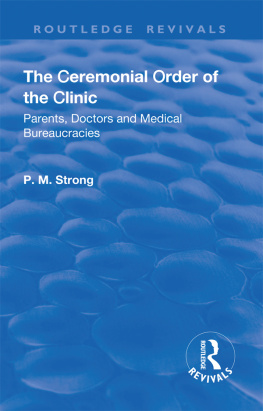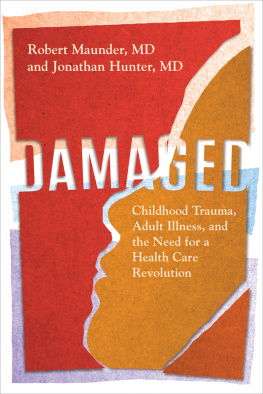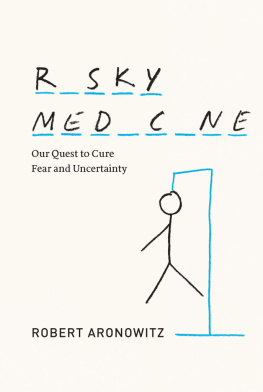ASPECTS OF ILLNESS
Cardiff Papers in Qualitative Research
About the Series
The Cardiff School of Social Sciences at Cardiff University is well known for the breadth and quality of its empirical research in various major areas of sociology and social policy. In particular, it enjoys an international reputation for research using qualitative methodology, including qualitative approaches to data collection and analysis.
This series publishes original sociological research that reflects the tradition of qualitative and ethnographic inquiry developed at Cardiff in recent years. The series includes monographs reporting on empirical research, collections of papers reporting on particular themes and other monographs or edited collections on methodological developments and issues.
Classics in Medical Sociology
An important new initiative featuring revised editions of influential titles in medical sociology.
Also available:
The Ceremonial Order of the Clinic
P.M. Strong and edited by Robert Dingwall
Aspects of Illness
Second edition
ROBERT DINGWALL
University of Nottingham
First published 2001 by Ashgate Publishing
Reissued 2018 by Routledge
2 Park Square, Milton Park, Abingdon, Oxon, OX14 4RN
711 Third Avenue, New York, NY 10017, USA
Routledge is an imprint of the Taylor & Francis Group, an informa business
Copyright Robert Dingwall 2001
All rights reserved. No part of this book may be reprinted or reproduced or utilised in any form or by any electronic, mechanical, or other means, now known or hereafter invented, including photocopying and recording, or in any information storage or retrieval system, without permission in writing from the publishers.
Notice:
Product or corporate names may be trademarks or registered trademarks, and are used only for identification and explanation without intent to infringe.
Publishers Note
The publisher has gone to great lengths to ensure the quality of this reprint but points out that some imperfections in the original copies may be apparent.
Disclaimer
The publisher has made every effort to trace copyright holders and welcomes correspondence from those they have been unable to contact.
A Library of Congress record exists under LC control number: 00132829
ISBN 13: 978-1-138-73284-1 (hbk)
ISBN 13: 978-1-351-74184-2 (ebk)
Contents
The justification for making this book available again reflects the extent to which two of the windmills at which it tilts continue to be with us and still need to be challenged. Aspects tried both to argue for the need for sociologists to be more critical of the positivist version of disease that was, and still largely is, hegemonic among our medical colleagues, and to insist that constructionist accounts cannot disregard the materiality of the human body and the disturbances to which its biology is subjected. Medical sociology remains pressed from each side.
The first chapter is directed mainly at the literature on illness behaviour and its attempt to specify social psychological models to explain why people act as they do in response to sickness. This line of work has continued into the currently fashionable Health Belief Model (Becker et al. 1972, Rosenstock et al. 1988) and other social psychological models (Conner and Norman 1996), to which much of the same critique can be applied. The arguments here are primarily methodological and reflect the early impact of ethnomethodological thinking on the group of medical sociologists then working in Aberdeen. In particular, they focus on the problem of the post hoc investigation of populations already classified by a medical diagnosis. Using Schutzs language, how can we derive in order to motives from because of motives, the processes involved in formulating and initiating actions from those involved in explaining and justifying them? The difficulties are compounded by the lack of evidence that the classification adopted by doctors for the purposes of specifying a diagnosis and an intervention has any original salience for the people presenting themselves for classification. Indeed, as Parsons (1951) understood and Freidson (1986,1994) has reiterated, we sometimes have to present ourselves to health professionals purely to have our self-classification affirmed for official purposes like access to social security or insurance benefits. Most of the time, though, we are brought to consult professionals because their licence (Hughes 1971), jurisdiction (Abbott 1988) or settlement (Abbott 2001) means that they know things that we do not.
The pragmatic achievements of this knowledge have, however, allowed its owners to assert an extensive mandate (Hughes 1971) over its application and development. In the present context, this is the pull of the policy audience (Sarat and Silbey 1988) that has drawn a great deal of sociological effort into investigating the social correlates of medical classifications. This is a valuable enterprise but it should not be confused with the distinctive contribution that sociologists may be able to make to understanding how people come to decide that they are sick and what they then do about it. That enterprise is much less fashionable and receives less acknowledgment from the funders of health sciences research because it seems to be less practical or less keyed to their political agendas. In practice, however, as has been recognised increasingly over the last twenty years or so, it is a vital element in the development of effective interventions. Leaving aside those odd occasions on which we come more or less directly to the attention of health professionals - road accidents, collapses in the street, etc. - everything that the professionals have to deal with is filtered first through a process of self and lay assessment using whatever everyday knowledge is to hand. Moreover, which Aspects did not bring out at the time, what we do subsequent to professional intervention is also subject to the same filtration. If we want to change any of these processes, we still need a body of basic research on what lay people know, how they come to know it and how they use that knowledge. Without such work, many interventions to prevent ill-health, promote health or encourage concordance are simply a heartbreaking waste of time and money.
From the second chapter onwards, Aspects attempted to explore what a lay-centred study of illness might look like. Two points might be drawn out from this. The first is the implications of understanding illness as deviance. This was one of the great conceptual developments in medical sociology around 1970, although its foundation was really laid by Parsons (1951). This line of analysis has since gone into decline, for reasons that are not entirely clear. In part, though, it reflects the neglect of Parsonss attempt to think fundamentally about the nature of social organisation and the failure of medical sociologists to keep pace with the reappraisal of this, particularly by Camic (1987). The idea, that it makes a difference whether deviance is seen to be motivated or unmotivated, which Parsons elaborated in The Social System, is one of the most powerful tools that we have for exploring the differences in the control systems represented by medicine and by law. From this, we come to the second point, namely the value of seeing illness as some form of failure of everyday life. The argument for this is elaborated from what were then the unpublished lecture notes of Harvey Sacks (1995). Sacks showed that being ordinary was something that we had to work at. We had to know what it would take to be ordinary and we had to be able to command the skills and resources, including our own bodies, to do this. The combination of Parsons and Sacks generated a view of illness as a failure of ordinariness that was not seen as intentional and therefore potentially triggered a range of micro and macro social response that were restorative and supportive, while still containing the deviance.








